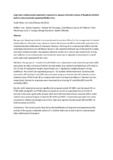Please use this identifier to cite or link to this item:
https://cris.library.msu.ac.zw//handle/11408/1682| Title: | Long-term cardiovascular autonomic responses to aqueous ethanolic extract of Boophone disticha bulb in early maternally separated BALB/c mice | Authors: | Pote, William Tagwireyi, Dexter Chinyanga, Herbert M. Musara, Colin Pfukenyi, Davies M. Nkomozepi, Pilani Gadaga, Louis L. Nyandoro, George Chifamba, Jephat |
Keywords: | B. disticha, Antihypertensive activity, Autonomic response, Cardiovascular comorbid disorders, Anxiety disorders | Issue Date: | 2014 | Publisher: | Elsevier | Series/Report no.: | South African Journal of Botany;Issue 94, p. 33 - 39 | Abstract: | Background: Boophone disticha is commonly used in southern Africa for the management of mental-related illnesses. Recently, it was shown to reduce blood pressure (BP) in maternally separated mice immediately after withdrawal of treatment. However, the long-term cardiovascular effects and the underlying mechanisms are still illusive. Based on the reputed traditional use of the plant for anxiety and stress-related disorders, the aqueous-ethanolic extract of B. disticha was screened for its long-term effects on the cardiovascular and autonomic responses to repeated acute stressors in adult early maternally separated BALB/c mice. Methods: Five groups (n = 6 each) of adult BALB/c mice subjected to early maternal separation (MS) were given six daily oral doses of vehicle (normal saline); low, medium and high doses of B. disticha (10, 25 and 40 mg/kg body weight, respectively); and 1 mg/kg body weight diazepam during adulthood. The control (un-separated) group (n = 6) received vehicle treatment. Cardiovascular parameters (BP and heart rate (HR)) were recorded using non-invasive tail-cuff methods on post-treatment days (PTDs) 9 and 30 to compare short-term and long-term effects of the plant extract, respectively. Autonomic responses were measured by estimating BP variability (BPV) and HR variability (HRV). Results: Early maternal separation significantly increased systolic BP (SBP), and decreased HR on PTD9 while raising BPV on PTD30 when compared to control un-separated mice (p b 0.05). B. disticha at low dose significantly reduced short-term SBP and mean arterial pressure (MAP), while medium dose reduced long-term diastolic BP (DBP) and MAP in maternally separated mice when compared to vehicle and diazepam (p b 0.05). High dose significantly decreased SBP and MAP at both occasions (p b 0.05). Conclusions: The current results have led to the identification of long-term antihypertensive-like activity of the aqueous ethanolic extract of B. disticha which was found to last for several weeks after withdrawal of treatment | URI: | http://www.sciencedirect.com/science/article/pii/S0254629914000878 http://hdl.handle.net/11408/1682 |
ISSN: | 0254-6299 |
| Appears in Collections: | Research Papers |
Files in This Item:
| File | Description | Size | Format | |
|---|---|---|---|---|
| Long term cardiovascular Abstract.pdf | 217.85 kB | Adobe PDF |  View/Open |
Page view(s)
54
checked on Apr 18, 2025
Download(s)
14
checked on Apr 18, 2025
Google ScholarTM
Check
Items in MSUIR are protected by copyright, with all rights reserved, unless otherwise indicated.



